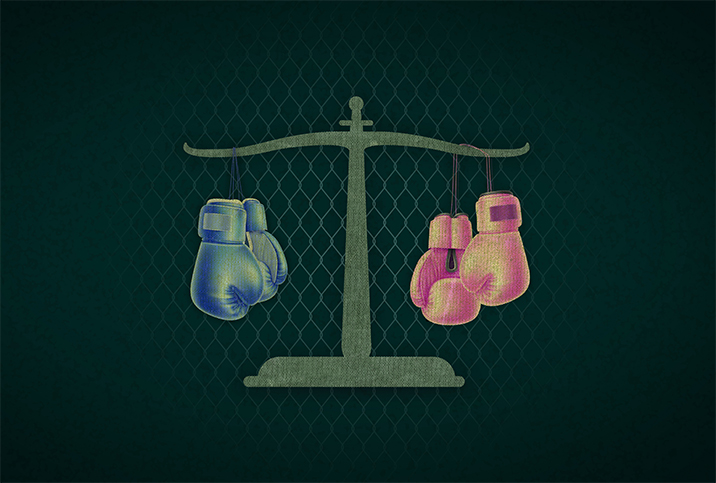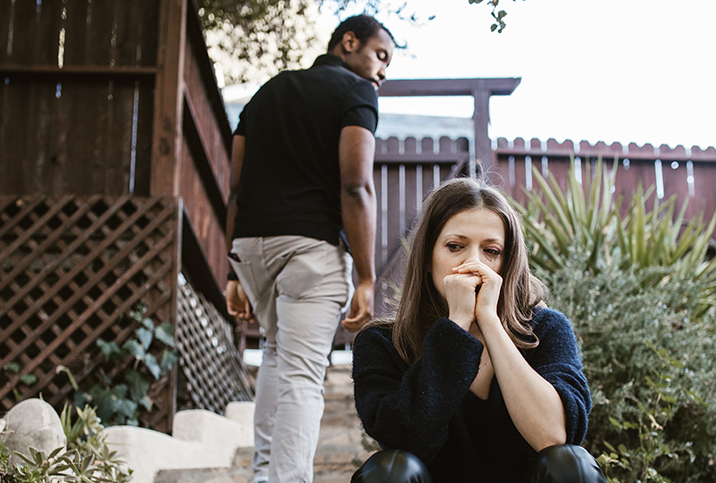How Can You Use Emotional Regulation Strategies to Fight Fairly?

Any relationship—from romantic to platonic, family member to co-worker—has a potential for conflict.
Behavioral strategies, such as using "I" statements and sticking to one topic, can help you move toward a resolution of conflict, but nothing will work if the embattled parties aren't able to maintain awareness and stewardship of their emotions.
Start with your emotion first
"Conflict can easily set off our 'fight-flight-freeze' response when our nervous system is in a state of hyperarousal or hypoarousal," said Peggy Loo, Ph.D., a psychologist and the director of Manhattan Therapy Collective, based in New York City.
Hyperarousal, which could take the form of fight or flight, occurs when someone is overwhelmed and subsequently isn't able to respond thoughtfully.
Hypoarousal (freeze) is when they shut down or dissociate because of the situation. Both are complex survival responses that serve a purpose but don't allow for higher-level processing at the time.
"For many who have had negative experiences of conflict or even trauma histories, dysregulation is more likely to happen," Loo said. "Neuroscience shows that we literally cannot do our best thinking, listening or collaborative problem-solving from this place because we are purely thinking about our own survival.
"One of the most important things to pay attention to during conflict is your internal state of emotional regulation…or dysregulation," she added.
Having emotional regulation means being able to respond effectively to your emotional landscape.
"It isn't about having to feel happy or suppressing emotions," Loo continued. "It's about being in the driver's seat so that you are managing your emotions rather than them managing you."
Emotional dysregulation could entail physical, emotional or cognitive changes, including:
Physical changes
- Heart pounding
- Rapid breathing
- Tightness in the chest or belly
- Trembling
Emotional changes
- Anger
- Anxiety
- Despair
- Fear
- Numbness
Cognitive changes
- Confusion
- Feeling overwhelmed
- Inability to respond
- Indecision
- Irritation
In an argument or other conflict, you may notice yourself behaving in unproductive ways, such as blaming others or lashing out. Alternatively, you may find yourself apologizing or agreeing to something just to end discomfort.
Stepping away from the conversation
If you or your partner feels dysregulated during a verbal conflict, pause the conversation.
"Trying to plow through a difficult conversation to fix it quickly when you're emotionally dysregulated is a recipe for failure," Loo said. "You are more likely to say or do something you will regret, which will only add to your stress.
"Respecting that your partner may need this break when you do not is vital. Fighting fairly only occurs when both people can genuinely show up, and doing whatever it takes for this to happen is a huge part of success," she said.
There are many other reasons besides dysregulation to halt a disagreement. Maybe it has been going on a long time and you are no closer to a resolution. It could be time to go to work. Maybe the baby has woken up from their nap.
"Pausing the conflict midstream allows both people to calm down. Navigating conflict is much easier when neither person is triggered," explained Andrea Dindinger, L.M.F.T., a therapist in San Francisco who works with individuals and couples struggling in their romantic relationships.
"The key part of the pause is to commit to a specific time when you will return to the discussion," Dindinger elaborated. "When practiced regularly, this approach builds safety in the relationship and decreases the fear associated with conflict. I love challenging the old advice of never going to bed angry. It is amazing how sometimes a good night of sleep will make any conflict feel less intense."
Dindinger suggested choosing a safe word to signal the need to stop the conversation mid-conflict.
"I like to use the word 'bookmark' because you can say it in any environment, even in public or in front of the kids," she said.
Take care of yourself
After the conversation has paused, take time to soothe and reengage with yourself. Try to identify how you're feeling, the emotion you are experiencing and the sensations those feelings create in your body.
"This may mean that you need to get something to eat, process with a friend or therapist, or take a very long walk, nap or hot shower before coming back to the conversation," Loo suggested.
Dindinger recommended thinking about all the people who have loved you throughout your life, even if they are no longer a part of your daily life.
"When you are taking care of how you feel from the inside, conflict is much easier to navigate and resolve," she said.
Return for round two
While it takes two to tango—and at least that many to fight—the only person you have control over during a conflict is yourself. No matter who the conflict is with, emotional self-awareness is an important key to fighting fairly.
In returning to a disagreement, Dindinger advised keeping in mind all the reasons you love and appreciate your partner.
"Remember, they are not the enemy and they are a perfectly imperfect person, just like you," she said.
Author Anne Dillon has been married to her husband, Dan, for 22 years. They have three sons ages 15 to 19 in Durham, North Carolina. Dillon said her marriage is "the strongest marriage I know, though we have plenty of conflicts."
"We wouldn't be as close as we are now without going through the muck together," Dillon said. "It has forged us into something stronger than we were. I think the whole goal of fighting fairly should be for both parties to understand the other side's perspective; not to agree with it, necessarily, but to understand it and to show that to the other person.
"That generally gets both sides feeling heard, which takes the fire out of the situation," she added. "I know that's been true for Dan and me. It's kind of like a magic pill."


















